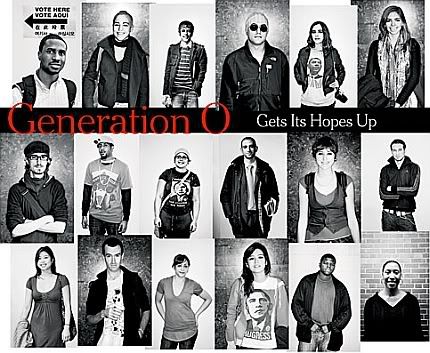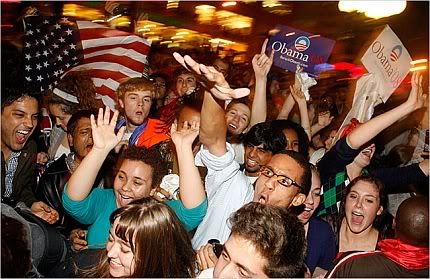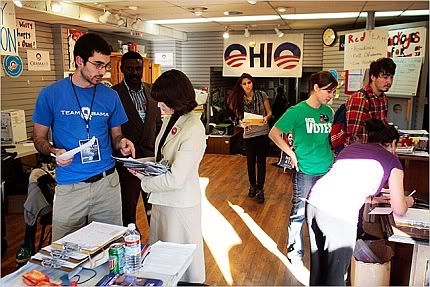La Generación 0 , factor primordial en la elección de B. Obama.
Fashion & Style. |
| Generation O Gets Its Hopes Up By DAMIEN CAVE Published: November 7, 2008 |
|
|
| GENERATION O is that college kid at the White House gate early Wednesday morning, lifting his shirt to reveal "Obama" painted in red on his chest. Or that stylized Obama T-shirt that makes irony look old, the "Obama Girl" on YouTube, or the thousands of notes on Barack Obama's Facebook page: "U are the best!!!" "yeah, buddy." And, of course, Generation O is the president-elect himself. Only a Fugees-loving, pick-up-basketball-playing, biracial president-elect would send supporters an e-mail message on election night that said: "I'm about to head to Grant Park to talk to everyone gathered there, but I wanted to write to you first." He signed it simply "Barack." After all, they were close. He and his biggest fans, the generation of young adults who voted for him in record numbers, together had slogged through 21 months of campaigning. And in his moment of victory, Barack Obama shared the glow of success. "All of this happened because of you," the e-mail message said. "We just made history." With that simple "we" in millions of in-boxes, the post-baby-boomer era seems to have begun. The endless "us versus them" battles of the '60s, over Vietnam, abortion, race and gender, at least for a moment last week, seemed as out-of-touch as a rotary phone. Of course, that was Mr. Obama's goal. In his book, "The Audacity of Hope," he was explicit in his desire to move beyond "the psychodrama of the Baby Boom generation a tale rooted in old grudges and revenge plots hatched on a handful of college campuses long ago." Mr. Obama's victory was greatly helped by his young allies. More 18- to 29-year-olds went to the polls this year than in any election since 1972 between 21.6 million and 23.9 million, up from about 19.4 million in 2004, according to preliminary estimates from the Center for Information and Research of Civic Learning and Engagement. And 66 percent voted for Mr. Obama, according to exit polls by Edison/Mitofsky. These young voters and those slightly older, who together may forever be known as Generation O, were the ground troops of the campaign. They opened hundreds of Obama offices in remote areas, registered voters and persuaded older relatives to take a chance on the man with the middle name Hussein. They saw in Mr. Obama, 47, who was born at the tail end of the baby boom era, the values that sociologists and cultural critics ascribe to them. Government under Mr. Obama, they believe, would value personal disclosure and transparency in the mode of social-networking sites. Teamwork would be in fashion, along with a strict meritocracy. The pinnacle and promise of that approach can be seen in Tuesday's stunning victory. But as January's presidential realities inevitably chip away at November's idealism, a few valleys may be around the corner. With two wars and a financial crisis to face, this generation may soon discover the limits of their consensus-oriented focus and unyielding faith in networks and communication. In many ways 2008 looks a lot like 1960, said Robert Dallek, the presidential historian. In both cases, a young Democrat won on a promise of youthful change. Voters, Mr. Dallek said, "want something fresh." President Kennedyresponded not just with soaring rhetoric and new programs like the Peace Corps. He also transformed communication between the president and the people. At the White House, he projected an image of openness and transparency. He let photographers take pictures of the Kennedy children. He held televised news conferences for the first time. |
|
|
| Theodore Sorensen, the Kennedy speechwriter, said the youthfulness of Camelot brought a new casualness and intimacy to Washington. He recalled a softball game with reporters in the early '60s, in which the younger staff members invited the Council of Economic Advisersto play. Three older economists showed up and tried to fit in. "They took off their jackets and ties," Mr. Sorensen said. "They didn't go home to change into blue jeans, but they were swinging bats." Mr. Obama has created his own jacketless atmosphere, but on a grander scale, with a steady stream of e-mail messages and Facebook postings. Obama supporters know, of course, that the text messages from "Barack" are the work of a campaign aide, but that doesn't mean that it's not effective. Ellen Steiner, 23, a graduate student at the University of Colorado, Denver, said the direct style "makes me feel like I really was part of something great." Reid Johnson, 31, a volunteer at the Obama office in Wilson, N.C., agreed. "You get the feeling that you're becoming friends with him in that casual way," he said. "I think everyone takes ownership of it because you feel like you know who he is." It would be hard to overestimate how much communication and an informal tone means to this generation. They have poured out their foibles and triumphs on blogs, MySpace, Facebook or Twitter. Older Americans see this as dangerous exhibitionism, but young adults believe the conversation leads to open-mindedness and consensus. "This generation has been knocked for putting all of their personal stuff on full display," said Mik Moore, 34, a founder of the Great Schlep, which used a Sarah Silverman online video to help young Jews win their grandparents' support for Senator Obama. "But there is an upside, too, which is a willingness to communicate with large numbers of people in your network about what's important to you." Ideology doesn't matter. Young evangelicals can be just as creative in their use of the Web as liberal bloggers. The point is that communication technology is the tool that makes all things possible, from hook-ups and pop songs to protests or the president of their choice, said Neil Howe, a sociologist who studies young adults. And the enthusiasm has a way of spreading. Wearing a pink Chanel suit and gold heels, Holly Hennessy, a wealthy older Republican woman in Palm Beach, Fla., came out of the polls on Tuesday with goose bumps after deciding at the last second to vote for Mr. Obama. Matthew Weiner, the creator of "Mad Men," the AMC television series set in the early '60s, predicted that there would be more to come. "A year from now you're going to see that 65 to 70 percent of the people are going to claim they voted for Obama even if they didn't," he said. "That's what happened with Kennedy. People will be swept up in it." And yet, such a sweeping success could also breed trouble. "The risk is they vote for the first time, and then there's this incredible long-shot win 'Gee this is easy,' " said Kurt Andersen, a founder of Spy and former editor of New York Magazine. There is also "a risk of this generation conflating our iPhones with the substantive policy progress that the iPhones and laptops enable." Inevitably, he said, "growing up is all about disappointment and things not going well so that is a natural next step." The pain of dashed hopes, if it comes, could be eased by this generation's news media diet, which has made them fantastically informed and skeptical. Or it could be worsened by the psychology of how they were raised and came of age. |
|
|
| Ronald Alsop, author of "The Trophy Kids Grow Up: How the Millennial Generation is Shaking Up the Workplace," said that because today's young people have been trained to trust teams and systems they love checklists they often struggle when things do not go according to plan. Compounding the problem, they have also been told by everyone from Mom to Barney the Dinosaur that they are destined for greatness. They have seen 25-year-olds become millionaires overnight with companies like Google, and after helping Mr. Obama win, the question is whether they will settle for anything less than a central role. "They are used to getting a lot of awards and coddling from their parents, coaches and teachers," Mr. Alsop said. "So if they're put in some menial position, in a political or corporate environment, they are not going to be happy." On Mr. Obama's Facebook page, there are already needy supporters like Viki, who wrote, "Please keep this dialogue going." "We are here for you," she added, "and I am anxious to see, now that you have won, if you will keep your momentum with the people or let us go." Mr. Johnson, the volunteer in North Carolina, said that the new president needs to refresh his Internet presence to keep young constituents passionate. "There's a lot of attention deficit with this generation," he said. "You have to keep people engaged and active because it's a highly technical society and there are lots of ways to distract our minds." As if on cue, President-elect Obama posted pictures of election night on flickr and introduced a new Web site, change.gov, on Thursday. "Share your story and your ideas," it says, "and be part of bringing positive lasting change to this country." The site is in many ways an extension of the Obama campaign: casual, cool, interactive. BUT if these are the traits of the young, might they alienate older Americans? Mr. Dallek said that for the new president to succeed, he must be seen as representative of not just the new, but also the traditional. "This is the challenge: How to sustain the energy of these young people and fulfill their expectations but not go so far to be seen by these older folks as overreaching." Many baby boomers are unlikely to be comfortable with this generation's technological boosterism and ease with blurred identities and mixed ethnicities. Peter Wolson, a psychoanalyst and former dean of the Los Angeles of Institute and Society for Psychoanalytic Studies, said the crucible of the 1960s helped give baby boomers a deep suspicion of "the other." Their world was bifurcated: pro-war versus antiwar; communist versus capitalist. "There is a fear of intimacy and merging because of the sense that you'll be taken over by the other," Mr. Wolson said. "The fear is: 'We'll get the wool pulled over our eyes. We'll get taken advantage of.' " Seeing a new crop of young people texting their way to the Oval Office may never soothe those fearful boomers. For others, the generational transition may bring relief as the country seems to move past old, entrenched conflicts. Chuck D., 48, the rapper and former lead of Public Enemy, said he has been amazed at the ease with which his 20-year-old daughter and her friends have interacted with politics this year. While he spent his youth shouting the message, "Fight the power," his daughter fell in love with a candidate, voted for the first time and got exactly what she wanted. He couldn't be more pleased. "She doesn't bring the burden of history with her," he said. "She's not pigeonholed. She's free to make a healthy decision for the future." |




0 Comments:
Post a Comment
Subscribe to Post Comments [Atom]
<< Home